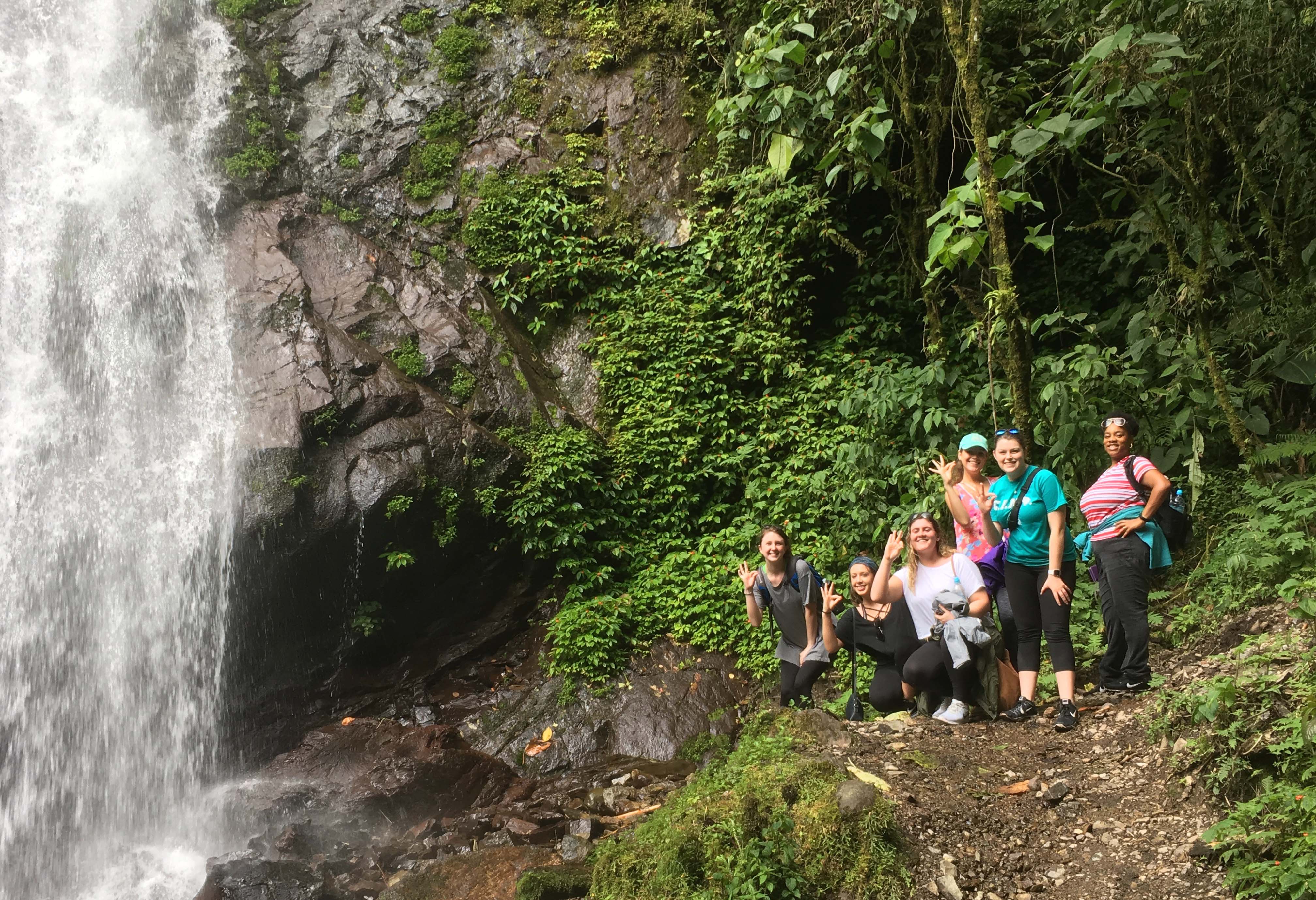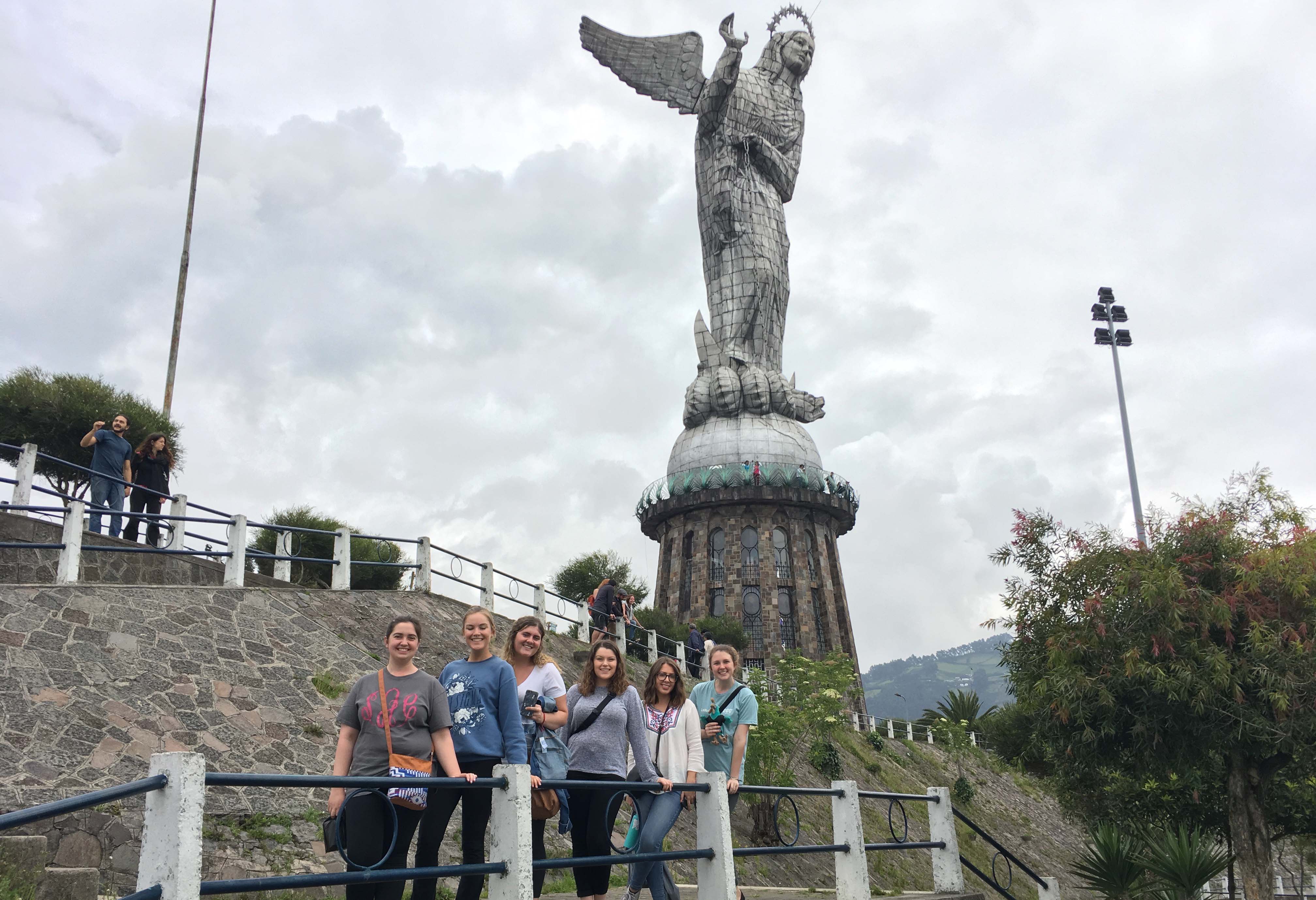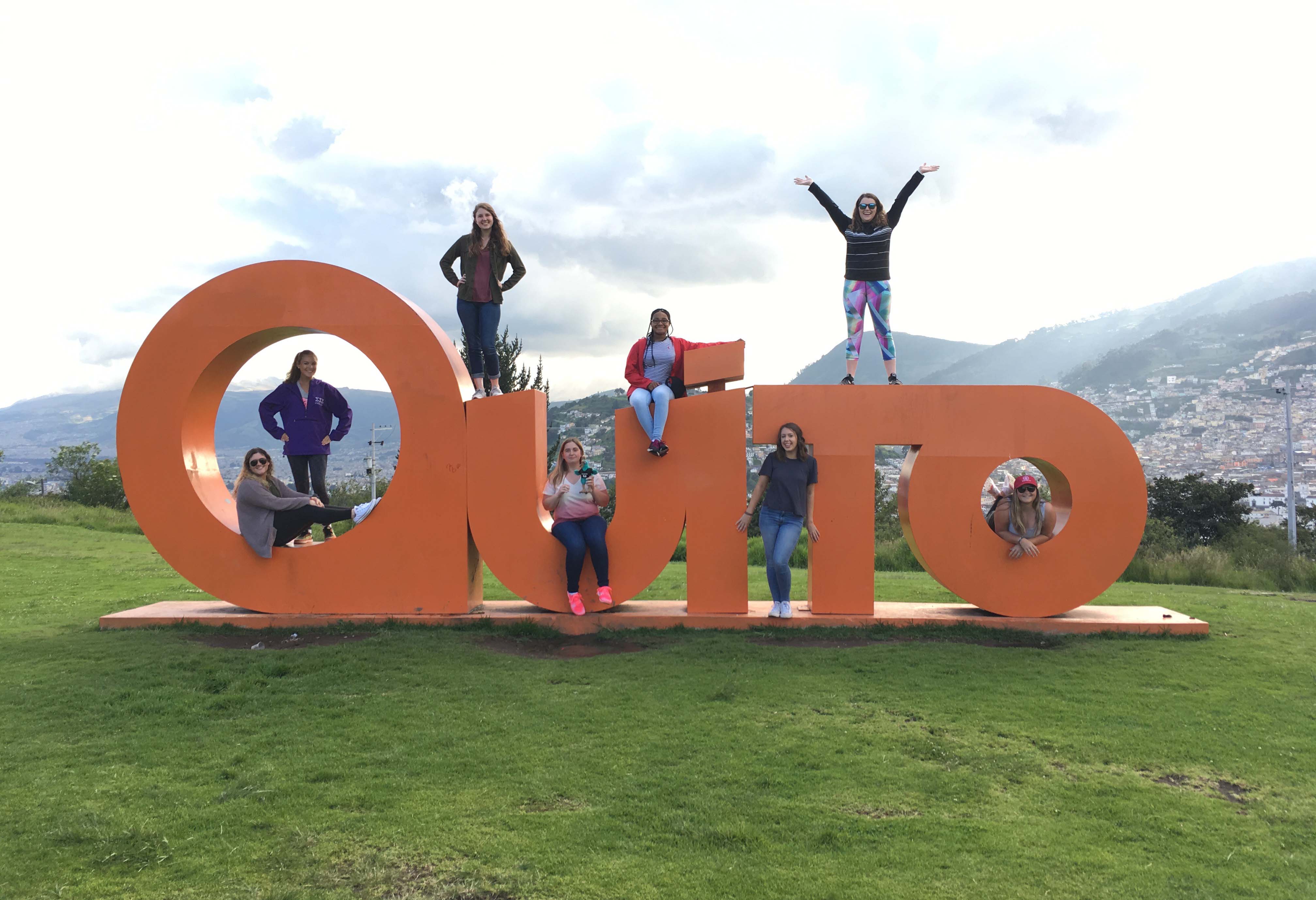Culture and Education in Ecuador
COVID-19 notice: Due to entry restrictions in Ecuador, this program will be requiring students to show proof of vaccination against COVID-19 by the commitment deadline of December 4th. Follow us on Instagram! @spadonicollegeofed
Program Details
- Location: Quito, Ecuador
- U.S. State Department Travel Information for Ecuador
- U.S. State Department COVID-19 Information for Ecuador
- Program Dates: May 10 - June 4, 2022
- Travel Abroad Dates: May 14 - May 23, 2022
- Cost to Participate: $3105 plus tuition, tech fee, and estimated out-of-pocket expenses
- Online Application
Participants will take part in an international education and culture course that provides a unique opportunity to apply book knowledge, theory, and personal experiences with students and school types in a different culture. In Ecuador, participants will observe children and schooling in an international K-12 multi-lingual, English immersion school, a nonprofit preschool, and public elementary schools. Students will work with the students and examine aspects of culture, teaching methods, and developmental theory that relate to education in both the United State and Ecuador. Weekday mornings will be spent at various schools, with afternoons used to tour local heritage sites and landmarks.
The second course offered provides students an opportunity to learn more about science in non-school settings. Ecuador provides the perfect environment to do so, with the high altitude of the Andes mountains and the lower level rainforest of Mindo. Because Ecuador is located directly on the Equator, students can examine the scientific principles of being on the equator, including the Coriolis effect. Students will visit a birds of prey center to learn about native species and the impact of humans on the local environment. A visit to a chocolate production site allows them to see firsthand how native plants are used to create sources of income for natives.
This opportunity allows our students to experience life as a foreign language newcomer in the school, city, and county, much like the students they will have in their own classrooms. It provides opportunities to experience a new culture and environment and to gain an appreciation for the diverse cultural experiences that students come from when entering their classrooms.
Students will spend nine days in Ecuador, visiting local schools and exploring the diverse biological environment. They will hear lectures from faculty at the Universidad de San Francisco in Quito, who has planned a full itinerary for them of cultural and educational experiences. Participants will observe children in an international K-12 multilingual, English instruction, school, as well as public Ecuadorian schools. Students will work with the students and examine aspects of culture, teaching methods, and developmental theory that relate to education in both the United States and Ecuador. Weekday mornings will be spent in the schools, with afternoons used to tour local heritage sites and landmarks including the historic City Center (a UNESCO World Heritage Site), Mindo Cloud Forest, Parque Condor, and Otovalo. Evenings will be dedicated to course/class activities.
Physical Requirements: Participants must be comfortable hiking and walking on cobblestone roads. Additionally, the capital of Quito sits high in the Andean foothills at an altitude of 9,350 feet (2,850 meters). Healthy bodies can adapt to the challenges of high altitude remarkably well, but until acclimatization occurs, the stresses of altitude can tax the heart and lungs, particularly if they are not entirely healthy to begin with.
Course Information
Both courses fulfill Core Curriculum requirements. EDUC 270 Q is an approved substitute for the second science requirement for Early Childhood. EDUC 274 Q is an approved substitute for EDUC 215 for all education programs.
EDUC 270 Q Informal Science Teaching: Teaching Science in Non-school Settings. (3 credits). (Prereq: none). This course is designed to introduce students to the world of informal science education, or science taught in non-school settings such as museums, state parks, environmental education centers, and zoos. This course will include, among other topics, the study of environmental education curricula, zoology education, and methods of implementation. The course is designed for those who have had little or no professional preparation in education courses, but are interested in learning how to communicate scientific information to children and the public. At the conclusion of the course, students will be able to present education information from fields including herpetology (reptiles and amphibians), entomology (insects), and marine sciences to children and the general public. The focus of the course will be on informal educational experiences. Students meet for class on the CCU campus for three days prior to departure, and for one week after return from the program. Satisfies New Core Skills - Human and Social Behavior.
Instructor: Catherine Scott
EDUC 274 Q Special Topics in Education: Culture and Education in Ecuador. (3 credits). (Prereq: none). This program is a unique opportunity for students to apply book knowledge, theory, and personal experiences with students and school types in a different cultural setting. In Ecuador, participants will observe children in an international K-12 multi-lingual, English instruction school for eight days. Students will work with the students and examine aspects of culture, teaching methods, and developmental theory that relate to education in both the United States and Ecuador. Weekday mornings will be spent in the schools or education-related settings, with afternoons used to tour local heritage sites and landmarks. Satisfies EDUC 215, Old Core Goal 5B or New Core Skills 1B.
Instructor: Jamia Richmond
SOC 101 Introductory Sociology. (3 credits). (Prereq: non). An introduction to the sociological study of social interaction, social structures, social institutions, social inequalities, social change, the social construction of human life, and other selected topics. Sociology draws upon a variety of social scientific research methods, sociological concepts and social theory to reveal the social basis of everyday life by exploring the interplay between society and the individual.
Instructor: Craig Boylstein
Accommodations and Meals
Students will stay in double rooms at a local hotel in Cumbaya. Breakfast is included with hotel, and lunch will be provided each full day in Ecuador.
Program Leaders
Dr. Catherine Scott, Associate Professor, Foundations, Curriculum, and Instruction, Spadoni College of Education
cscott1@coastal.edu, 843-349-6558
Dr. Catherine Scott earned her Ph.D. in Elementary Science and Math Education from the University of North Carolina at Greensboro and her Master's degree in K-6 Science Education from the University of North Carolina at Greensboro. She spent five years teaching elementary school at the 4th, 5th and K-5 Science levels. Her scholarship is in the area of outdoor and environmental education. Dr. Scott has worked with faculty from USFQ and CCU to study environmental education program in the Galapagos, Ecuador. In May 2017 and 2018, Dr. Scott led a CCU Education Abroad program to Ecuador. She has led two previous trips to Ecuador for the College of Education. In addition, she competed research in Ecuador through a university PEG grant. She has been to Ecuador and worked with our partnering institution four times over the past six years. Prior to coming to CCU, she also led a study abroad trip to Costa Rica in conservation biology, and participated in education trips to Peru and Belize through the NC Museum of Natural Sciences’ Educators of Excellence.
 Dr. Jamia Thomas Richmond, Associate Professor, Foundations, Curriculum, and Instruction, Spadoni College of Education
Dr. Jamia Thomas Richmond, Associate Professor, Foundations, Curriculum, and Instruction, Spadoni College of Education
jrichmon@coastal.edu, 843-349-6578
Dr. Richmond completed the Faculty Peer Mentoring Program for Study Abroad through participation on the South Carolina to South Africa Study Abroad Program in South Africa during the 2016 Maymester. Since that time, she has lead two trips to South Africa and one trip to Ecuador. Prior to coming to CCU, I participated in an education trip to Peru. She obtained a Doctorate of Philosophy in Education with a specialization in Exceptional Student Education from the University of Central Florida in the spring of 2004. Dr. Richmond was a Visiting Assistant Professor in the College of Education at the University of Central Florida Daytona Beach campus for four years. She has developed research interests around areas that can positively and significantly impact the quality of life of people of diverse cultural backgrounds. Currently, she is an Associate Professor in the Spadoni College of Education at Coastal Carolina University. Her research has focused on working with culturally diverse exceptional students and their families. Others areas of interest include parental involvement in education, collaboration among teachers and families, and recruitment and retention of minority students in teacher education programs.
 Dr. Craig Boylstein, Associate Professor, Sociology, Gupta College of Science
Dr. Craig Boylstein, Associate Professor, Sociology, Gupta College of Science
cboylset@coastal.edu, 843-349-2471
Dr. Boylstein's research interests include the lived experience of chronic illness, the impact of local, state, and federal drug laws, and police use-of-force. His most recent work is When Police Use Force: Context, Methods, Outcomes (Lynne Rienner Publishers, 2018).
Cost to Participate = Program Fee ($3105) + Tuition (Number of Credits x Tuition Rate) + Technology Fee (Varies) + Out-of-pocket Expenses ($515)
The tuition for this course is for Maymester term.
Included in Program Fee: Roundtrip airfare from U.S. to Ecuador; accommodations while in country; ground transportation; 2 meals a day (breakfast and lunch); planned excursions; and emergency medical insurance
Not Included in Program Fee:
- Estimated out-of-pocket expenses: $515 for meals, passport cost, optional excursions, and vaccinations (entry/reentry) not covered by program fees. Please note that this estimate will vary based on individual spending habits. Students should ask their program leaders for more details about estimated out-of-pocket expenses.
| Discounted Tuition for Education Abroad Students: $416/credit | |||||
| CCU credits | Program Fee | Tuition | Technology Fee ($5/credit) |
Out-of-pocket Expenses (estimate) |
Cost to Participate |
| 3 credits | $3105 | $1248 | $15 | $515 | $4883 |
| 6 credits | $3105 | $2496 | $30 | $515 | $6146 |
Payment Schedule
| Payment | Due Date | Amount Due |
| Deposit | Oct. 27, 2021 | $300 (refundable until commitment deadline Dec. 4, 2021) |
| Remaining Program Fee Payment | Feb. 11, 2022 | $2805 |
| Tuition and Technology Fee Payment | May 7, 2022 | Varies (see above) |
After acceptance to the program, the payment of the program fee as well as payment of tuition can be made online through WebAdvisor or in-person/by phone through Student Accounts. Tuition charges are distinct and different from program fee charges. Please note that payments made with a debit or credit card will be charged a non-refundable service fee of 2.7 percent. For more information about methods of payment, visit Student Accounts.
Current Travel Conditions:
- Universidad San Francisco de Quito (USFQ)
- AIG Ecuador Country Report
- CIA World Factbook Ecuador
- U.S. State Department Travel Information
- U.S. State Department COVID-19 Information for Ecuador
- CDC Health Information
CCU Travel Resources:
General Travel Resources:
- Know Your Travel Risk
- US Embassy Updates – COVID-Related Restrictions on Returning to the USA
- US Embassies – Country Specific COVID-Regulations for Entry and Stay by Country
- U.S. Department of State(DOS)
- Smart Traveler Enrollment Program (state.gov)
- Centers for Disease Control and Prevention(CDC)
- Overseas Security Advisory Council (OSAC)
- International Air Transport Association (IATA)
- Traveler’s Checklist (US Department of State)
- FBI Safety and Security for US Students Traveling Abroad
- World Health Organization (WHO)
- TripPrep







